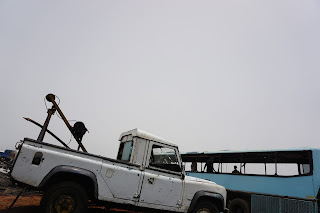What's the purpose of this blog? I often meet people who share the interest in ethical exports and electronics recycling, and we exchange information, each developing deeper knowledge through the relationships.
But the blog is also a journal. It can capture my own thinking about a "big story".
And "e-waste" is really not a big story at all. It's a fairly small part of recycling, Recycling is really important because it avoids mining and preserves added value. It's really rude to future generations to burn up limited fossil fuels, warm the planet, and then throw away the metal and plastics and do it over again. It's really rude to tell a generation of Africans starving for Mass Communications / teledensity that they should buy brand new stuff most cannot afford because our sense of liability -
an ethical luxury - comes first.
Throughout the blog there are facts that I share with academics and researchers and policy makers, and then there are places where I get angry and vent - as I'd do in a journal. What is most important are the big perspectives which I can only comprehend a bite at a time.
Recycling policy becomes
a lens to view
ethics in a way that
observes cross-cultural and economic interest's "spin" on those ethics.
Ethics really have to be understood as coming from a source of good, a right and wrong, poles. It's possible that the most cynical view of ethics - that it's all evolved psychology and genetic nurture and greed - is true. We have to be willing to consider it. But I think an evolved, polished, enlightened Ethics which takes into account evolution and psychology and enlightened self interest is a thing of beauty, a work of art, and a gift to future generations.
Another long intro leads us here: My outline of self interest in international ethics.
[thanks to virtual pal Rafa Font of Belgium for sharing the article by Courtney Martin, The Reductive Seduction of Other Peoples Problems]
1. The Ethics Illiterate
We tend to call people "evil" in literature, but most of the evil I see in the world is more of an ethical blindness. People who really just care about something else, about themselves, about money, about pleasure.
There are people who would eat 1,000 endangered species tongues on toast and throw the rest away just for the sense of privilege, power and luxury (and even if cheese tasted better). But in my experience, assholes aren't really thinking about ethical questions. They would as soon burn a phone book as a Bible.
The worst problems in the world aren't created by Marvel Comics evil people, but by those who are mostly illiterate in ethics, and don't know how to feel good about sustainability. The action is evil, the murder is evil. What's in the evil mind is a waste.
2. The Ethics Superficial

There are many people who have a general awareness of ethics and are on the right side, they think. But while they may be literate in right and wrong, they don't really read novels, if you get my drift.
The morality is often a currency which they see has a social value.
They want to be
friends with people who are ethical (which is really smart), and they follow the opinions of the tribes they find themselves in.
The Ethical Superficials may evolve into more professional ethics agents, or they may be satisfied to see themselves as ethically superior to Ethical Illiterates, earning an internal "moral currency" for having expressed "politically correct" or "religiously correct" views.







